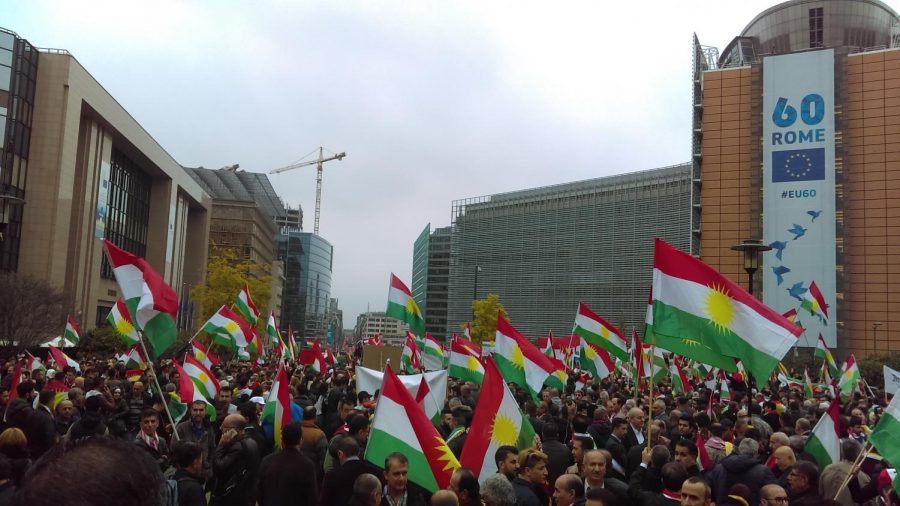America Has the Blood of the Kurds on Its Hands
October 14, 2019
“The Kurds do not have a country, and they never will.”
It was almost shocking to hear those cold words from my always-warm host mother who lovingly prepared pumpkin pancakes and tiramisu for dinner every night. It was even more shocking to see my extremely liberal host sister, who, on the second day we’d ever been together, proudly announced that she “did not believe in God,” nodding along with her.
This past summer, as part of the U.S. State Department’s National Security Language Initiative for Youth (NSLI-Y), I spent six weeks studying abroad on a full merit scholarship in Bursa, Turkey and immersing myself in the Turkish language and culture. I loved every part of the experience, from meeting new friends from all across the country to the intensive language classes taught by the incomparable Murat Bey to the street food I could buy at any time of day. Most importantly, though, I loved my host family: warm, always-caring, they made me truly feel like part of their family as they took me on trips to the beach and Eskisehir.
Critically, my host mother and sister were both adamantly anti-Erdoğan, scoffing at his efforts to impose religious curricula in the Turkish education system and his censorship of sites like Wikipedia—which was why, when I made an error on my Turkish homework and accidentally translated “kırgızistan” as “Kurdistan,” the Kurdish-majority region of Iraq, I was surprised to hear them react in such a cold, harsh manner. Yet I know now that many Turks feel the same way. Many Turks see Kurds—Turkey’s largest minority ethnic group, which resides within the boundaries of numerous Middle Eastern states yet lacks its own homeland—as a danger to Turkish stability.
After all, the founding of Turkey occurred concurrently with the still-unacknowledged Armenian genocide, which was an attempt to create an ethnically-homogenous Turkish state. The modern history of Turkey has contained numerous instances of repression of the Kurds, from a 1924 mandate banning the words “Kurd” and “Kurdistan” to, even today, a Turkish law which makes it illegal for parents to give their children Kurdish names that contain the letters of “w,” “x,” or “q,” which are not native to the Turkish language.
Which brings us to our current conflict. In the late 1970s, the Kurdistan Workers’ Party (PKK), a Marxist-Leninist group designated by both the U.S. and Turkish governments as a terrorist organization, was founded with the aim of creating an independent Kurdish state within Turkey’s boundaries. Since then, the PKK has been engaged in sporadic outbursts of violence against Turkish forces.
In Syria, one of the U.S.’s allies in the war against ISIS was the Syrian Democratic Forces (SDF), which was led by Kurdish forces who were part of the Kurdish People’s Protection Unit (YPG). Turkey’s bone to pick with this has been the loose association between the YPG and the PKK, and as the YPG gained ground close to the Turkish-Syrian border, President Erdoğan of Turkey began to consider the YPG’s presence a national security concern.
This national security concern, however, does not exist in a vacuum. Erdoğan’s political position in Turkey has dramatically fallen over the past months, marked by his party’s loss of mayoral posts in both Istanbul and Ankara, two of Turkey’s biggest and most important cities. Turkey’s economy has also been in a free-fall spiral for the better part of the last year, something I witnessed first-hand as I went to exchange money weekly in Bursa and kept seeing the Turkish Lira:USD exchange rate inch up. A final domestic concern for Erdoğan is the large Syrian refugee population in Turkey, a population often derided by Turks, whose prevailing attitude seems to be “get them out as soon as possible,” particularly as the state of the economy has deteriorated. As such, Erdoğan has formulated a plan to seemingly “solve” all of these problems in one sweeping action: clear out the YPG forces from the Turkish-Syrian border—a move which would undeniably be popular with the broader Turkish population and perhaps revitalize his political standing—and then create a “safe zone” to resettle Syrian refugees. Of course, this isn’t a solution at all.
Firstly, refugees will be returned to what is still a war zone. Secondly, this is little more than a pretense for Erdoğan’s army to conduct a mass slaughter of the very Kurdish forces which helped the U.S. for years on end. Oh, and one more thing: YPG forces have been guarding a network of ISIS prisons in that very area, and if Turkish forces begin their offensive, the forces will almost certainly flee—as well as ISIS militants currently being held in those prisons.
And that brings us to this past week. This week, President Trump, in a remarkably dense (but perhaps not unexpected, given his clear lack of foreign policy acumen and unwillingness to consider any policy positions besides those which appeal to his narrow base) move urged by Erdoğan, stated that the U.S. would begin withdrawing its troops from Syria—even from the area currently occupied by the YPG—creating the perfect situation for Erdoğan to begin enacting his plan. Part of his reasoning behind this was that ISIS’s strength in the region has dramatically been weakened. This is true, but ISIS forces do still remain in the region, and these are the ones that will likely hold out for years to come. Additionally, Trump’s reasoning for abandoning the Kurds is utterly ridiculous; one “fact” he cited was that the Kurds “didn’t help [the US] with Normandy.” Normandy, as in the invasion of the Normandy beaches in the D-Day operation. By that logic, we should also abandon our other current allies like the Germans and Japanese—after all, not only did they not help us in World War II, but they actively fought against us.
Although Trump’s reasoning was clearly not sound, the consequences of his decision are real. Practically everything that was predicted to occur if Erdoğan began implementing his plan already has. 70,000 Syrians have already been displaced from their homes. At least ten civilians, including an infant, have been killed. About 170 Kurds have been slaughtered. 5 ISIS militants have escaped from a Kurd-run prison. The Trump administration’s proposed solution to the inevitable continued slaughter of Kurdish forces? Sanctions. “We can shut down the Turkish economy if we need to,” stated Treasury Secretary Steven Mnuchin. And yes, we could. But we never even needed to get to this point. Now, the U.S. stands with blood on its hands—the blood of Syrians and Kurds alike—and no amount of sanctions can change that.

















































































































































